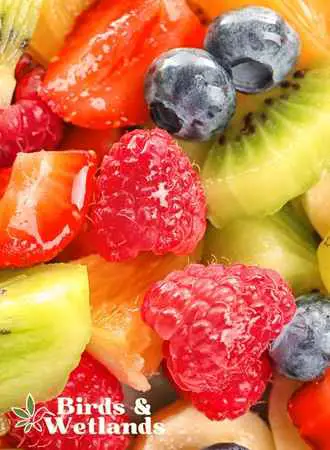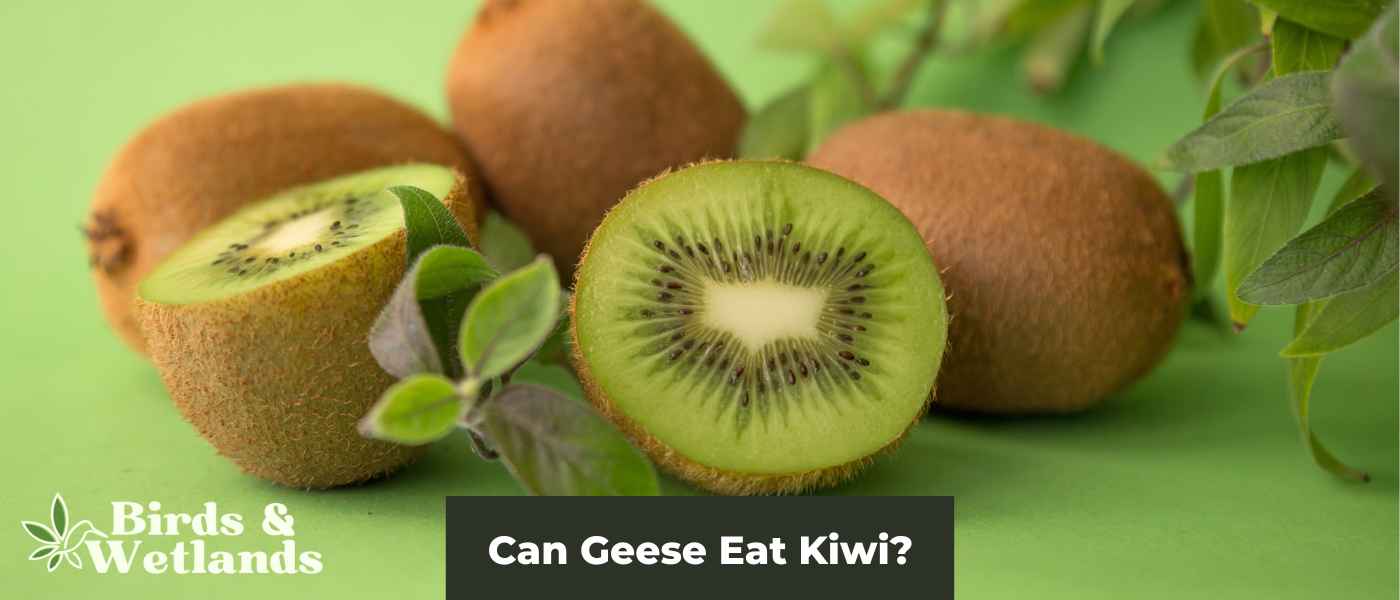Kiwi is a fruit that is often consumed for its health benefits. It is high in vitamin C, which is essential for good health. Kiwis can be a part of a healthy diet for humans, but can geese eat kiwi?
Yes, geese can eat kiwi. Kiwi is a nutritious food option for geese and can provide a variety of vitamins and minerals. However, it’s important to feed kiwi in moderation as part of a balanced diet and not as the only food option offered to geese. Overconsumption of kiwi can lead to digestive issues such as diarrhea and bloating.
In fact, it may even have some health benefits for them. Kiwi is a good source of antioxidants and vitamins, which are important for birds. In addition, kiwis can help to boost the immune system and protect against disease. Adding kiwis could be beneficial if geese are getting enough other nutrients in their diet.
Key Points
- Adult and baby geese can eat kiwi.
- Kiwis are packed with vitamin C and other vitamins.
- You can leave the skin and seeds on when serving kiwis to your geese.
- You can mix kiwis with other fruits such as bananas.
Is kiwi fruit good for geese?
As any pet owner knows, feeding your animal a nutritious diet is important. Not only does this help keep them active and alert, but it can also prevent various health problems. For example, kiwis are an excellent source of vitamins and antioxidants, making them an ideal food for geese.
These fruits are also a good source of fiber, which can help to keep the gastrointestinal system working properly. In addition, kiwis are known to have anti-inflammatory properties, which can be beneficial for animals with arthritis or other joint problems.
Kiwis are also known for their vitamin C content. Birds require vitamin C for a number of reasons. It promotes iron optimal iron absorption and helps maintain and produce energy and the synthesis of proteins.
It also supports wound healing, keeps the immune system functioning properly, protects against oxidative damage and plays a role in the development of feathers and beak tissue.
Kiwis are rich in other vitamins too. They contain Vitamin K which is essential for blood clotting and wound healing, and it also aids in bone metabolism. Vitamin K is also required for proper blood vessel development.
This is especially important for young waterfowl, whose blood vessels are still developing. Young waterfowl who do not get enough vitamin K may develop problems with their blood vessels, which can lead to serious health problems later in life.
| Nutrient | Amount per 100 g | Benefit for Geese |
|---|---|---|
| Vitamin C | 154% of the daily value (DV) | Supports the immune system and helps with wound healing |
| Vitamin K | 78% of the DV | Helps with blood clotting and proper bone health |
| Fiber | 3g | Supports healthy digestion and helps regulate bowel movements |
| Potassium | 7% of the DV | Helps regulate fluid balance and supports proper heart and muscle function |
| Magnesium | 6% of the DV | Supports proper muscle and nerve function |
It’s important to note that the nutritional content of kiwi can vary depending on growing conditions and the stage of maturity at which it is harvested. Additionally, this table only provides a general idea of the nutrient content of kiwi and is not meant to replace veterinary advice for determining the best diet for your pet goose.
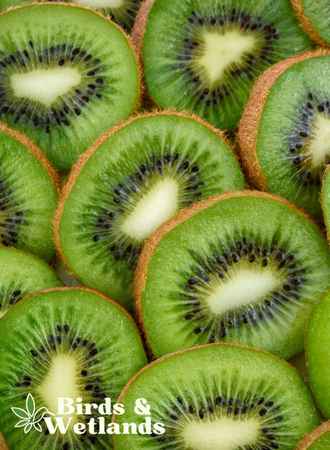
Can Kiwis be bad for geese?
Feeding too much kiwi to geese can lead to several potential health problems, including:
- Digestive Issues: Overconsumption of kiwi can lead to digestive issues such as diarrhea and bloating, which can be uncomfortable for geese.
- Vitamin Overdose: Kiwi is high in vitamin C and other vitamins and minerals, and consuming too much of these nutrients can cause an overdose.
- Oxalates: Kiwi contains oxalates, which are naturally occurring compounds that can bind with calcium and other minerals in the digestive tract, leading to the formation of crystals that can cause health problems.
- Increased Risk of Aspergillosis: Kiwi and other fruits contain a type of sugar called fructose, which can increase the risk of aspergillosis, a fungal infection that can be fatal for geese.
Therefore, it’s important to feed kiwi in moderation as part of a balanced diet and not as the only food option offered to geese.
Can geese eat kiwi skin?
Geese are fairly versatile when it comes to their diets and can eat a variety of fruits and vegetables. This includes kiwi skin, which is actually a good source of nutrition for these birds.
The skin of this fruit contains an abundance of vitamin A, which is essential for the growth and development of feathers.
Vitamin A is a fat-soluble vitamin, meaning that it helps to regulate the levels of fat in the goose’s body. As a result, kiwi skins can be a healthy and delicious treat for geese of all ages.
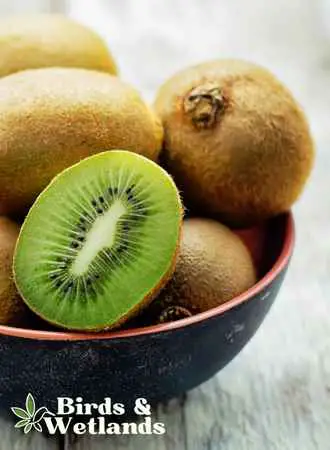
Can baby geese eat kiwis?
Yes, baby geese can eat kiwis. They are rich in vitamin C and other nutrients. Just make sure you don’t overfeed your baby geese with kiwis.
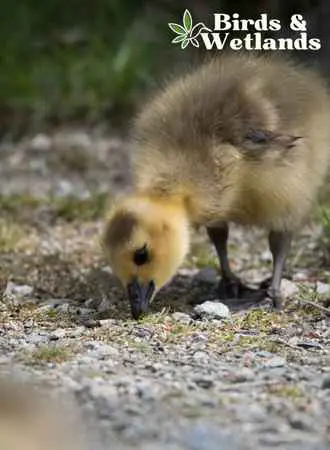
How often can geese eat kiwis?
When it comes to kiwis, geese can eat them occasionally, but they should only be given in small quantities. Kiwis are high in sugar, and too much sugar can lead to weight gain and other health problems in geese.
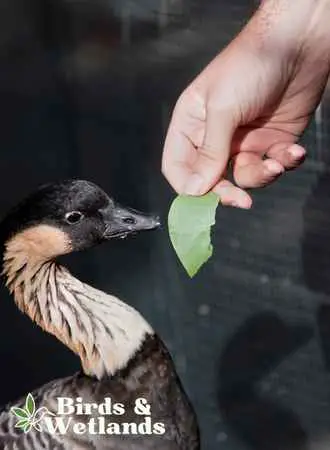
How to prepare and serve kiwis
Geese are particularly fond of kiwis, and the small size of the fruit makes it easy for them to feed. To prepare this fruit for geese, simply cut it into small pieces and serve it with water.
The natural sweetness of the fruit will be a hit with your feathered friends, and the high water content will help to keep them hydrated.
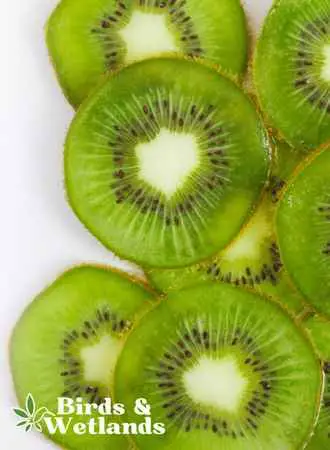
What other foods can you mix with kiwis?
While kiwi fruit is a popular treat for geese, it’s important to mix it with other foods to ensure a balanced diet. One way to do this is to add seeds and berries.
Both seeds and berries are packed with essential nutrients that help keep geese healthy. Other fruits and vegetables can also be mixed in with kiwi fruit, such as bananas or apples.
Bananas are a good source of potassium, which is important for proper heart function. When feeding kiwi fruit to geese, it’s important to mix it with other foods to ensure a balanced diet. By doing so, you’ll help keep your geese healthy and happy.
